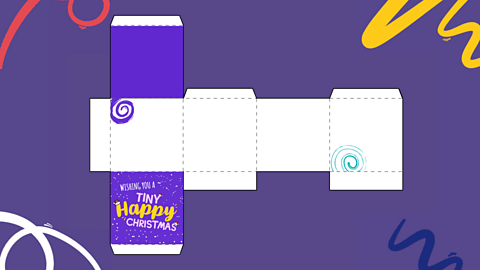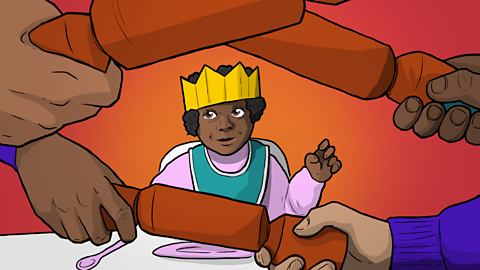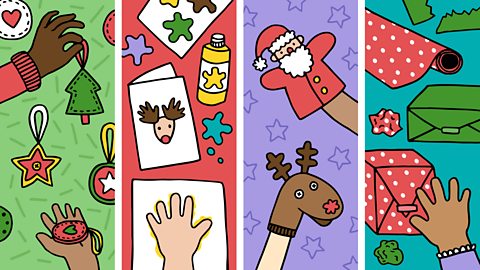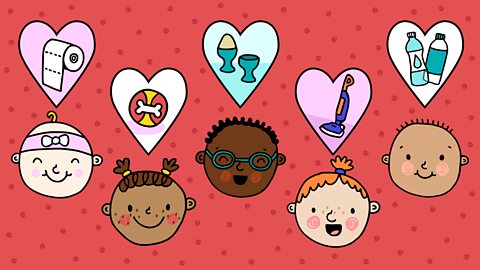How often has your child enjoyed the box and wrapping paper more than its contents?
It can be slightly deflating for you but looking on the bright side, it means there are limitless opportunities for play at Christmas and following birthdays.
ãWhat I love is that cardboard is so open-ended and versatile ã itãs brilliant just to see it change and become something new,ã says cardboard obsessive mum Polly Aktar, who shares her amazing creations on . ãIãve been making things for my son Idris since he was tiny and now heãs a toddler, he gets really involved. He comes up with ideas, helps build them and role-plays with the creations. The other great thing is that you donãt need tons of stuff to transform cardboard: just some glue, scissors, pens and sticky tape ã and imagination.ã
Make the most of the chat while you transform your cardboard and paper, adds speech and language therapist Janet Cooper. ãWhatever youãre making, whether your child is leading or you are as theyãre still too young, the important bit is talking about what youãre doing, being together and the experience of making something. The added joy is your child might start off saying they want it to be one thing, but the next day, it can be something else.ã
1. Cardboard Christmas decorations
If youãve already got surplus cardboard before Christmas, transform it into festive decorations with your little one. ãTheyãll help your home feel more Christmassy and this a great opportunity to enjoy some creative time with your children,ã says Polly. ãCut long strips and sculpt into cardboard snowflakes, or make a Christmas tree and Rudolph the Reindeerãs head out of flat pieces.ã
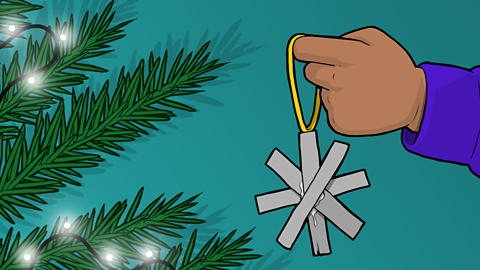
2. Postbox
A brilliant way to introduce new words to your toddler: gather a selection of household items and name them as you ãpostã them through your DIY post box.
3. Scrap people
Make characters out of your leftover boxes and wrapping paper tubes ã work together but let your child take the lead and ask them lots of questions about what theyãre doing.
4. Pass the parcel
ãThis is a great listening game for your little one,ã explains Janet. ãWhen the music stops, whoever is holding the parcel unwraps a layer ã the final layer can contain an old toy and doesnãt have to be a 'prize' every time.ã
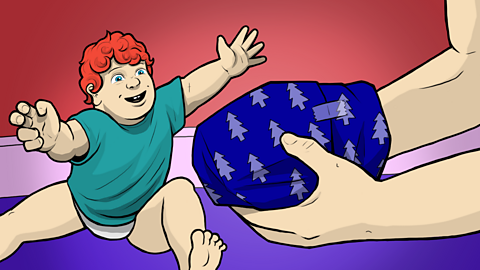
5. Letting rip
The sensory experience of ripping paper is great for your childãs language development: make the most of opening gifts together and describe all the sounds you hear.
6. Shape puzzles
ãThis is a great activity that you can adjust according to your childãs age,ã says Polly. ãCut out pairs of shapes from cardboard, mix them up and challenge your child to find the matching shape. If your child is younger, they could match up colours and if theyãre a bit older, try more complicated shapes.ã
7. Cleaning gear
Children love helping around the house, so how about transforming cardboard into their own kit? ãEven if all you do is create a door on a big box, they can imagine itãs a washing machine,ã explains Polly. ãOr make a vacuum cleaner using a cardboard box for the main part and a long wrapping paper tube as the nozzle. For a bucket, cut a rectangular piece of card for the base and then fold a longer piece around the edge and glue. And for use a long tube or lots of smaller tubes glued together and use strips of paper to create the mop head.ã
8. Car, boat, plane or train
ãLet your child decide what form of transport theyãre taking and help them transform a large box by adding wheels or wings. Get them to sit in their vehicle, talk about where theyãre going and make noises too: symbolic noise is a great way for younger children to use sounds that have meaning before they know actual words,ã says Janet.
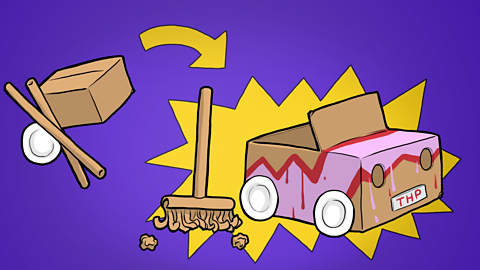
9. Musical fun with toddlers
Singing and making music together is a great bonding activity ã and you can use cardboard to create instruments too. Try a box guitar using a cardboard box, tube and some elastic bands; make a simple box drum or fill an empty festive snack tube with rice or lentils for a DIY rainstick.
10. Wipeable easel
ãSimply fold over a large piece of cardboard over on itself so it stands on its own. And create one panel or panels on both sides using cellophane or sticky tape so your little one can draw on it using wipeable pens,ã says Polly.
11. Cardboard binoculars
Cut a wrapping paper tube into several sections and make a couple of pairs of binoculars to spot interesting things out of window and enjoy a game of ãI Spyã.
12. Simple threading and sensory boxes
ãCut out a section of sturdy cardboard, pierce several holes through it and give your child a selection of things like ribbon or string to thread through and pull. Itãs great for their fine motor skills,ã explains Polly. If you want to take it up a level, try making your little one a sensory box.
13. Throwing game
Place different sized boxes on the floor as your targets and use rolled up socks or waste paper as balls. The whole family can get involved and itãs a great way to boost your child's concentration and focus skills.
14. Paper roll pencil tidy
ãStick a selection of rolls on a section of stiff cardboard and decorate: you could even make them into an animal shape. The reason I love this one so much is that it also encourages your child to tidy up their pens and crayons ã because they made it, theyãre more likely to use it,ã says Polly.
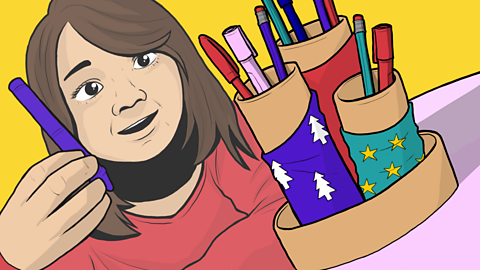
15. ãÎ wherever your childãs imagination takes you
ãIf you ask 10 small children what to do with a cardboard box, theyãll probably have enough ideas to fill a book. So, if your child is a toddler or older, let them decide what to do,ã says Janet.
16. Make your own DIY gift box!
Need some inspo? Use our free printable activity sheet with a step by step guide of how to create your own gift box at home!
Print and cut out this template to create your own DIY gift box.
